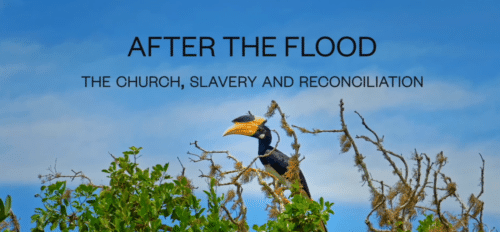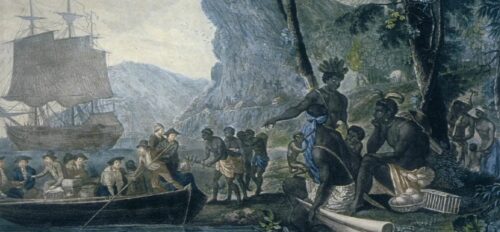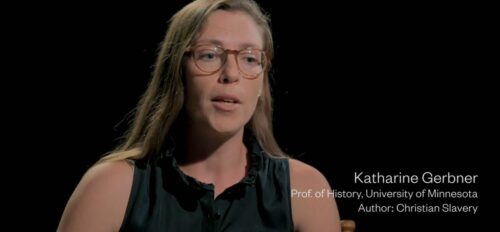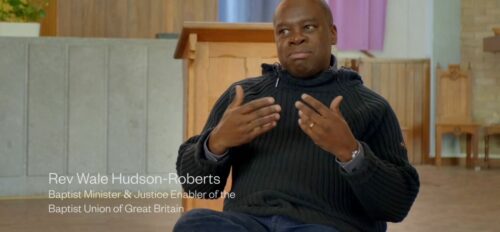After The Flood – how Christians used Noah’s drunken curse to defend slavery
Since George Floyd, there have been many films and books on slavery and racism, but few that focus on the active and disgraceful role of UK churches.
This film is incredibly well made with superb, on-location shots in the West Indies and UK, and insights from theologians and academics who, despite their great learning, speak plain, everyday English! It’s highly watchable, easily understood, and the brainchild of Professor Robert Beckford, on behalf of the Movement for Justice and Reconciliation. Beckford also acts as the narrator.
Strange beginnings
The documentary begins with the bizarre story of Noah getting drunk and how, from this single event, Christian support for slavery emerged. Here’s what happened: In Genesis 9, the flood has subsided, the animals and Noah’s family are safe, all seems well. But then, Noah drinks too much wine and gets drunk. He falls asleep, naked. His youngest son, Ham, sees him naked and informs his two older brothers. They avert their eyes, so they don’t see their father’s nakedness, and cover him with a blanket. Noah awakes and directs his anger toward Ham, or in fact the son of Ham, called Canaan. Noah cries out:
“Cursed be Canaan!
The lowest of slaves
will he be to his brothers.” (Genesis 9,25)
Astonishingly, this single, highly contestable, and incredibly tenuous passage became the “biblical proof” for Christians defending slavery, from the 17th century onwards. In fact, “the Curse of Ham” was defended in a Bible commentary as recently as 1966. How on earth Christians could do this, and where it eventually led, is explained in this engaging one-hour film, After the Flood.
The film depicts how, from the seventeenth century, English Protestants, believing themselves to be the new people of God, plant colonies in the Americas. They grow the transatlantic slave trade and use New and Old Testaments as their justification. In fact, slave owners even resisted missionary work among the slaves, fearing that baptised slaves would demand their freedom.
Light and dark
There are bright spots where a few missionaries take the horrors of what they witness back to the UK to expose them. But, instead of fuelling a movement against slavery (that came much later), it lead to ever more determined efforts to reconcile the gospel with the sheer brutality of slavery. This “Christian theology of slavery” was defended, not least because the UK depended on slave money for its economic wellbeing. In fact, Christian promoters of slavery became so convinced of their cause that they considered abolitionist movements to be anti-Biblical.
There are several shocking incidents of cruelty, shamefully perpetrated in the name of Christianity, detailed in the documentary — most notably a Christian mission society, named in the film who actually “branded” their slaves with their mission name. This understanding of the gospel is so perverted, it beggars belief.
But there are also less-disturbing stories and anecdotes such as how the slave master, John Newton, overhears an African lament on board a slave ship. He later develops this to become the well-known Amazing Grace (but the popular idea that Newton became a Christian and immediately gave up slave trading is, sadly, not true).
Refreshingly this film never comes across as “angry”. So often, well-meaning, statue-toppling, monument-spraying protestors end up alienating reasonable people by their extreme actions. Sometimes extreme action is justified, indeed sometimes it is needed, but we also need thoughtful, well-made, engaging content- that’s what this film is.
An ongoing work
Toward the end, Beckford reflects on the present-day UK church’s response to its previous role in promoting slavery. On a positive note, there has been genuine work done to rectify the past with, for example, the UK’s Baptist Union in 2007 being the first denomination to offer an unequivocal apology for its own role in slavery. However, since then, it’s not clear what the BU, or any other denomination, has done to open up their archives and acknowledge where they have benefited from slavery, let alone consider the uncomfortable idea of reparation. It’s easy to say “sorry” — much harder to change a system where you’re the one who benefits. More troubling is the film’s point that, even today, the idea of black leaders instructing white Christians remains unacceptable in some UK churches.
This film is very well-produced and there are no major gripes. Perhaps time could have been spent on the Catholic church’s role in slavery as well as Protestant. And New Testament texts that speak on this topic are ignored. These include specific texts such as Ephesians 6 (slaves obey your masters), as well implicit texts which encouraged forced conversion to Christianity, such as the parable of the banquet, Luke 14 (where the king finally says “… compel them to come in”), and texts that have been misinterpreted to support colonial aggression, such as the Matthew 28 commission. But, this would have greatly increased the length of the film and potentially alienated audiences.
What we do have here is a beautifully made, informative and moving documentary well worth an hour of your time.
The premiere of After the Flood was in London on May 25, and at Spring Harvest sites in April. Click here for a list of upcoming screenings. The film will be available on general release very soon – if you wish to arrange a screening please contact info@mjr-uk.com. Lastly, everyone on the 7minutes.net mailing list will automatically be notified when this film is available – go to https://7minutes.net/, scroll to the bottom, type your email).







Yes, Chris I was aware of this — it was common teaching up to and well after the sixties. I think we need to all understand the fact that the scriptures were a production of their time in history and ‘curses’ were common in the OT. As you say Prof Beckford too has not been extensive enough in his research with little of the New Testament included and nothing regarding Catholic input into slavery (The Mission) film will be familiar to many. At Stockton Heath Christian Fellowship we are presently learning (once again) how to rightly divide the word of truth… Read more »
Hi — thanks for that (and yes it is Barbados where some of the documentary is based). Yes OT curses are not uncommon, but their interpretation and application (as you say, even up until the sixties) beggars belief Re your church, i have heard very positive things about Paul’s preaching, AND he is coming over to us at some point this Summer, so yes i will check this out 🙂 When did this series begin?
Hi Chris
The present series began a couple of weeks ago — but he did some good stuff on the subject of how we know the Bible is true/reliable etc., earlier on in the year. Are you doing Creamfields this year??
Hi — yes I will be at Creamfields — maybe see you there!